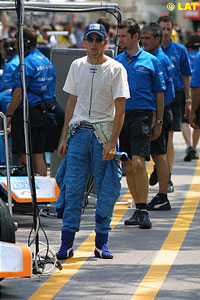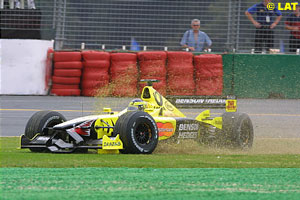
This week's Grapevine brings you |
So far this season, Jenson Button has had remarkably little to write home about: he has been comprehensively outshone by Giancarlo Fisichella, and rarely threatened to do anything other than run at the back of the grid.
So, what's the problem? If it's not the driver, then it has to be either the car, or the team. Support is forthcoming from Briatore, so there is encouragement from the top; and Benetton's engineers are certainly not novices. For the most part – there have been exceptions – the car Button runs is the same as Fisichella's, so what is going wrong?
Well, as it happens, there are two strong factors. Button has a style, learned from when he first started in karts, and drummed in by his father over the years. He is a smooth driver, in the mould of Damon Hill – and with the potential to match the Professor himself, Prost. He makes a responsive car sit on the edge of its performance envelope, and just nudges up to it, coaxing it round the circuit at top speed. That's what made Ralf's life difficult in the 2000 Williams – designed from the ground up with an excellent chassis, and that is what permitted Button to make such an impact at the highest level. This year's Benetton, on the other hand, is a difficult beast; if it were a horse, then it would be considered half wild, and still in need of taming. Every corner is a battle of will: the driver is compelling the car to turn, and manhandling it around the track.
Allegedly, this is the product of developing a car using relatively inexperienced drivers, though others believe it is the result of taking the Championship winning designs of '94 and '95 to their logical conclusions… but however it got into this state, it's not conducive to Button's style. Fisichella, whilst not happy about it, has been driving around this problem for years now, and the experience is paying dividends, at least when it comes to trouncing his teammate.
The other problem is related to the team. Button’s engineers are all very good, but they are used to working the Benetton way. Until now, they have put a driver in the car, then told him its characteristics, and expected him to adjust his style to suit the beast. It worked for Schumacher, and it has been the philosophy ever since. Now, however, they have been told a change is due. Button is clearly quick – he proved it at Williams – so he is clearly not the problem. So now, the engineers have the daunting task of establishing a baseline setup that works for their driver, and bringing the best out of the car, rather than the other way around.
Perhaps Button could improve his times if he improved his style, but Briatore does not think that's a good idea. In his opinion, the evolution at Benetton is headed for a dead end, so learning how to make the car work for Button's style has better long-term implications. And of course, with Renault taking up the mantle properly next year, that is precisely where his priorities lie.
At the time, few commented on Heinz-Harald Frentzen's withdrawal from the Canadian Grand Prix, claiming dizziness and loss of balance still affecting him since the crash at Monaco a fortnight before. However, never one to miss a trick, the paddock is running with new rumours, concerning the German's form, and potential future.
However, the bulk of the stories centre around two supposed clauses in Frentzen's Jordan contract: they are both options he can exercise. The first, interestingly, operates on Monday, immediately after the European Grand Prix: Frentzen has the option to re-sign to Jordan, guaranteeing his driving contract until the end of 2002. The other, with unknown dates, contains "a performance clause," permitting Frentzen to walk away from Jordan with no notice, should the team be performing below an undisclosed level in the Championship. Typically, any teams who offer performance clauses require a converse clause, permitting them to prevent an option being exercised if the driver fails to perform.
At the same time, there has been noise coming from the general direction of Toyota, who are supposed to be looking for a recognised talent to drive alongside Mika Salo in 2002, to ensure their first year in Formula One goes as well as possible. The world at large believes Allan McNish will not be racing.
Frentzen's name comes up for some fairly solid reasons: he is recognised as being better than average, for all his performance seems to depend on the support of the team around him. He has helped develop the Jordan, which is at least on the right end of the grid, if not heading it. And he lives around twenty minutes drive from the Toyota factory, which is very convenient.
Some question why Frentzen would sign for Toyota, who are targeting "a respectable entry," if he could remain with a team that challenges near the front; but Jordan have been struggling for the last two years, and are apparently going nowhere fast. It's been theorised that Frentzen could have spilled the beans on Friday after practice, and Jordan has sent him home whilst deciding what to do about it.
The fuel for the rumours is almost entirely down to Frentzen's sudden withdrawal in Canada. It is unusual for a driver to declare themselves fit at the start of the weekend, then to pull out after just Friday practice. The nature of the beast typically sees them carry on regardless – even if they only discover that it is too much when lined up on the grid, prompting a surreptitious retirement due to "gearbox failure" after the first lap. Being responsible enough (and seeing past their egos long enough) to recognise that their performance will be below that of the test driver is practically unheard of. So "something funny" has to be going on.
There are a lot of people in the paddock who should know better, who are betting that Jordan can prevent Frentzen exercising his re-sign option, if he has been out-qualified by Trulli seven times after the Nurburgring. As the driver has already been put to the sword six times in seven encounters, next Saturday is crunch time, if he wants to have any security in his job.
Then again, it's always possible he was just plain injured, and admitted it: after all, if any driver of this era doesn't have an oversized ego, it's Frentzen.
![]() Button working on style
Button working on style
 In the media at large, his star has certainly dimmed: the generic press relies on relative performance, and failing to beat your teammate makes you a worse driver. From their perspective, it's as simple as that. And this, despite the words from both Flavio Briatore and Frank Williams, who have continued to support Button, and will happily state that he is as good now as when he made Ralf Schumacher pick up his game to stay ahead last year.
In the media at large, his star has certainly dimmed: the generic press relies on relative performance, and failing to beat your teammate makes you a worse driver. From their perspective, it's as simple as that. And this, despite the words from both Flavio Briatore and Frank Williams, who have continued to support Button, and will happily state that he is as good now as when he made Ralf Schumacher pick up his game to stay ahead last year.
![]() Frentzen faces D-day
Frentzen faces D-day
 A few believe the poor chap got scared. After all, he did have a seriously big accident there a couple of years ago, when a brake disk exploded. And Friday practice quickly showed that the brake situation was marginal for the race... but by and large, that whole theory is discounted: particularly as Frentzen went well – until a brake problem ended his day – last year.
A few believe the poor chap got scared. After all, he did have a seriously big accident there a couple of years ago, when a brake disk exploded. And Friday practice quickly showed that the brake situation was marginal for the race... but by and large, that whole theory is discounted: particularly as Frentzen went well – until a brake problem ended his day – last year.
Please Contact Us for permission to republish this or any other material from Atlas F1.
|
Volume 7, Issue 25
Atlas F1 Special
Montoya's Pendulum:
from Hero to Zero
The 2001 Mid-Term Report
Unrealistic Expectations
Team Connaught Part II: Remembrance of Things Fast
European GP Preview
The European GP Preview
Technical Preview: Nurburgring
Focus: Fangio at the Nurburgring
Columns
Elsewhere in Racing
The European GP Trivia Quiz
F1 DVD Review
Bookworm Critique
Rear View Mirror
The Weekly Grapevine
> Homepage |
